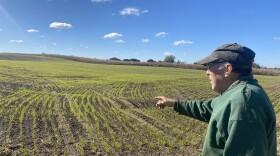-
Milwaukee-area anglers have been watching changes in ice fishing conditions as climate change takes its toll on winter weather.
-
Grasslyn Manor, a neighborhood within Milwaukee’s Sherman Park, has been grappling with flooded basements for decades. Despite the increasingly erratic weather climate change doles out, its residents are determined to curb their flooding problem.
-
The National Weather Service issued an “extreme cold watch" for southern Wisconsin from Jan. 22-24. Milwaukee-based meteorologist Paul Roebber explains what's causing the bitter cold.
-
The Trump administration wants to make it easier for infrastructure and energy projects to get off the ground. It sees dismantling a foundational environmental law called NEPA (National Environmental Protection Act) as one way to make that happen.
-
We revisit a few of the environmental change-makers we met in 2025. In big and small ways, they’re trying to make a difference in their Wisconsin communities.
-
Robin Greenfield is two months into a year-long quest to live on food he’s foraged. He hopes to inspire others to think about how our day-to-day decisions impact the world we share.
-
SBC Executive Director Jessy Servi Ortiz speaks about the council's Green Masters Program and the current landscape for sustainability in the business community.
-
There are varying opinions on the realities of climate change, which is backed by science. But at least one group of people is close enough to the effects of it to have a more insightful perspective: farmers.
-
Most people across the globe want their governments to act on climate change. In some countries, as much as 89% of the population is in that camp, according to a scientific journal called "Nature Climate Change."
-
Port Washington leaders and residents debate a proposed data center as communities across Wisconsin weigh the economic and environmental impact of tech expansion.
Play Live Radio
Next Up:
0:00
0:00
Available On Air Stations










